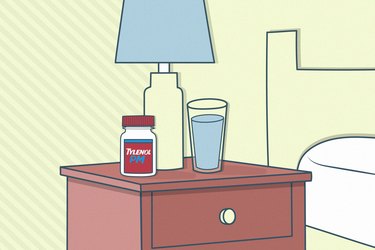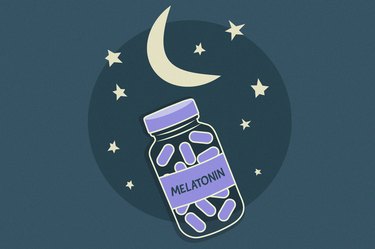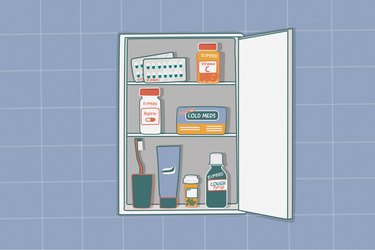
Tylenol PM can help you get a better night's sleep when you're in pain or while traveling. But relying on it for more than a few nights in a row may do more harm than good.
"Using Tylenol PM is generally safe and useful for temporary sleep disturbances such as jet lag or other short-term stressors in patients younger than 65. It should not be used for treating chronic insomnia," says Carla Podgurecki, MD, a family medicine physician with Texas Health Fort Worth.
Video of the Day
Video of the Day
Here's a closer look at what can happen, plus how many days in a row counts as too much.
First, What's In Tylenol PM?
Tylenol PM is a pain reliever as well as a sleep aid. It contains two active ingredients:
- Acetaminophen is an analgesic (painkiller) and fever-reducer that changes the way the body senses pain and cools the body. It can be used to relieve discomfort from problems like headaches, muscle aches, cramps, sore throat and toothaches.
- Diphenhydramine, is an antihistamine that has sedative effects. In addition to relieving allergy symptoms like itching, runny nose and irritated or watery eyes, diphenhydramine acts on the central nervous system to cause drowsiness, making it easier to fall and stay asleep.
Tylenol PM isn't the only pain reliever-sedative combination available over the counter. Medications including Excedrin PM, Unisom SleepGels and ZzzQuil also contain diphenhydramine, Dr. Podgurecki notes. Diphenhydramine is the active ingredient in allergy medicines like Benadryl too.
How Often Can You Take Tylenol PM?
Tylenol PM is designed to provide short-term relief from temporary sleep problems, not as a treatment for insomnia. "If you are using it for more than three consecutive nights, then you should discuss sleep issues with your doctor," says Dr. Podgurecki.
Long-Term Effects of Taking Tylenol PM
Pain relievers with diphenhydramine are generally considered safe for adults under 65. But they can be harmful when taken regularly, and older adults should steer clear altogether (more on that below).
1. It May Mask an Underlying Sleep Problem
It's not uncommon to have a short bout of sleep struggles here or there, especially if you're sick, injured or are traveling. But needing a medication like Tylenol PM to fall asleep each night could mean you have an underlying problem that isn't being addressed.
"To improve sleep, it's important to know why falling asleep or staying asleep is difficult, because the treatment options are specific to the cause," Dr. Podgurecki says.
Common culprits include pain, anxiety, depression, restless legs, sleep apnea, shift work disorder, chronic insomnia or poor sleep hygiene. Whatever the cause, it's worth a discussion with your doctor to better understand your treatment options.
2. It Can Become Less Effective Over Time
The body quickly develops a tolerance to medications like Tylenol PM, according to the Cleveland Clinic. Before long, you may find the dose that originally helped you fall asleep isn't getting the job done anymore.
"Quality of sleep becomes worse, and the person may have grogginess the next day," says Dr. Podgurecki.
On the other hand: "In some people it can paradoxically stimulate the central nervous system, which can result in difficulty sleeping," she says.
3. It Can Lead to Liver Damage
Consistent, long-term use of acetaminophen can be harmful to your liver, per the Mayo Clinic. That's especially true if you drink heavily.
"There's an increased risk of acute liver damage with taking chronic high doses if someone consumes more than three alcoholic drinks per day," says Dr. Podgurecki.
Mixing sleep aids like Tylenol PM with alcohol or other sedatives can also increase the risk of overdosing and death.
4. You May Experience Withdrawal Symptoms When You Stop Taking It
Once your body gets used to a nightly dose of Tylenol PM, stopping in one fell swoop can cause problems. There's a good chance you'll experience rebound insomnia, where your sleep difficulties come back worse than before, the Cleveland Clinic notes.
"Abrupt cessation of high doses can also cause acute withdrawal symptoms manifested by high fever, hypertension and bowel and bladder incontinence," Dr. Podgurecki says.
Who Should Not Take Tylenol PM?
Adults over 65 shouldn't take medications containing diphenhydramine at all. "They metabolize medications slower and are more likely to have medication interactions," says Dr. Podgurecki.
That can increase the risk for dangerous side effects like cognitive impairment, agitation, psychosis, dry mouth, blurry vision, increased eye pressure, constipation, urinary retention and falls.
You should also avoid taking diphenhydramine completely if you're pregnant, breastfeeding or have health problems such as closed-angle glaucoma, peptic ulcer or urinary retention, per the Mayo Clinic.
Alternatives to Taking Tylenol PM
It's important to talk with your doctor if you're regularly having trouble sleeping. Together, you can determine the underlying cause and decide on a treatment that's safe and effective. Your doctor may recommend to:
- Focus on sleep hygiene. Getting exercise during the day, sticking with a regular bedtime routine, limiting electronic use before bed, practicing relaxation techniques and avoiding caffeine and alcohol are go-to first steps for getting a better night's sleep, Dr. Podgurecki says. Note that you don't necessarily have to nix coffee and alcohol entirely; just limit these drinks close to bedtime.
- Try cognitive behavioral therapy (CBT). A proven treatment for insomnia, CBT teaches behavioral strategies that may make it easier to fall asleep without the need for medications, the Cleveland Clinic says.
- Schedule a sleep study. If your doctor suspects you have an underlying medical problem like sleep apnea or restless legs syndrome, a sleep study can confirm the diagnosis so you can start treatment.
So, How Bad Is It Really to Take Tylenol PM Every Night?
You shouldn't take Tylenol PM for more than three nights in a row. Not only can it lose its potency, but you could potentially become addicted and increase your risk for serious health problems.
"Relying on this medication every night to treat insomnia can lead someone down a slippery slope," Dr. Podgurecki says. "It is not recommended."
Was this article helpful?
150 Characters Max
0/150
Thank you for sharing!
Thank you for your feedback!
Is this an emergency? If you are experiencing serious medical symptoms, please see the National Library of Medicine’s list of signs you need emergency medical attention or call 911.



